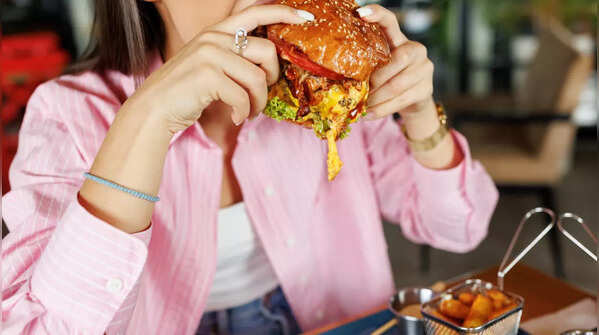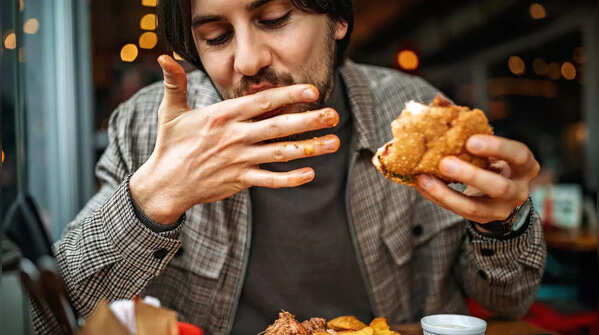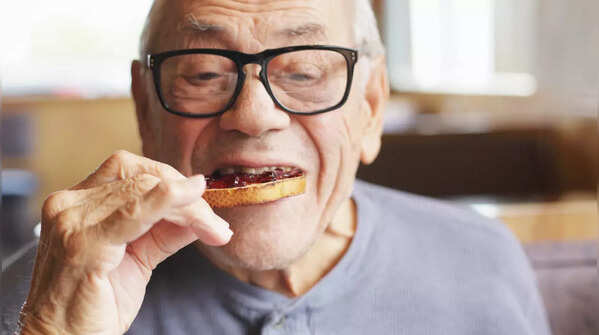Eating too fast? The real culprit is NOT how you eat
Eating Too Fast? New Research Suggests It's Not About How, But What You Eat
Rushing through meals is a common habit in today's fast-paced world. But a new study challenges the assumption that eating fast is solely related to how you eat. The research suggests that what you eat plays a more significant role.

As obesity rates rise globally, researchers are exploring accessible strategies for healthier eating. A study from Fujita Health University in Japan, published in the journal Nutrients, indicates that the type of food consumed has a greater impact on eating speed than the manner of consumption.

While health experts often recommend slow eating for better digestion and weight management, many find it difficult to implement. The researchers aimed to understand why and discovered that the choice of meal may be more critical in influencing eating speed.
Professor Iizuka, the lead researcher, stated, "Eating slowly is widely recommended for obesity prevention. Our study shows that simply choosing the right type of meal—such as a bento instead of fast food—can naturally extend meal duration and encourage more mindful eating."

The study involved 41 adults (18 males and 23 females) aged 20 to 65. Participants consumed three meal types: pizza, a hamburger steak bento with vegetables eaten first, and the same bento with vegetables eaten last. Researchers used chewing sensors and video analysis to measure meal duration, number of chews and bites, and chewing tempo.

The findings revealed that the pizza group ate significantly faster than the bento group, with shorter meal durations and fewer chews, regardless of vegetable consumption order. The bento meals, typically eaten with chopsticks and containing individual components like rice, vegetables, and meat, led to longer meal times and more chewing. Interestingly, the number of bites remained consistent across meal types, with only slight differences in chewing tempo.

The study also found that men generally ate faster and chewed less than women. Older participants ate faster than younger ones, possibly due to changes in dental health or chewing ability. Contrary to common stereotypes, no association was found between BMI and meal duration. However, individuals with obesity may be more inclined to consume ultra-processed, easy-to-eat foods like pizza, leading to faster meals and overeating.

Professor Iizuka explained, "One key factor affecting meal speed is how the food is served and eaten. Bento meals are served in small portions that need to be picked up with chopsticks, which slows down the process. In contrast, pizza is eaten by hand and is often designed to be eaten quickly. This difference in serving style plays a big role in how fast people eat."
The researchers emphasized that focusing on meal choices that require slower, more deliberate eating could be a simple yet powerful tool in combating obesity and related diseases. Instead of solely focusing on how to chew, choosing meals that naturally promote slower eating is key.
Newer articles
Older articles
-
 Selena Gomez and Hailey Bieber UNFOLLOW each other amid Justin Bieber drama
Selena Gomez and Hailey Bieber UNFOLLOW each other amid Justin Bieber drama
-
 Kajol reveals she watches horror films without sound: says it feels less scary
Kajol reveals she watches horror films without sound: says it feels less scary
-
 ‘Sitaare Zameen Par’ director RS Prasanna breaks silence on remake talk: 'The film will have the answers'
‘Sitaare Zameen Par’ director RS Prasanna breaks silence on remake talk: 'The film will have the answers'
-
 When Shah Rukh Khan teased Aamir Khan over a cup of tea: "Kal bata dena yaar...."
When Shah Rukh Khan teased Aamir Khan over a cup of tea: "Kal bata dena yaar...."
-
 Amitabh Bachchan calls working with son Abhishek Bachchan his 'greatest blessing'
Amitabh Bachchan calls working with son Abhishek Bachchan his 'greatest blessing'
-
 Aamir Khan’s Sitaare Zameen Par picks up momentum on release day as last-hour bookings surge past 10,000 tickets
Aamir Khan’s Sitaare Zameen Par picks up momentum on release day as last-hour bookings surge past 10,000 tickets
-
 Mona Singh reveals physical challenges behind her role in Aamir Khan's 'Laal Singh Chaddha': 'I had to completely transform my lifestyle'
Mona Singh reveals physical challenges behind her role in Aamir Khan's 'Laal Singh Chaddha': 'I had to completely transform my lifestyle'
-
 Rath Yatra 2025: The legend of why Lord Jagannath’s idol was left incomplete
Rath Yatra 2025: The legend of why Lord Jagannath’s idol was left incomplete
-
 Cheteshwar Pujara mocks Michael Vaughan's 4-0 prediction on Live TV, demands signature on failed post
Cheteshwar Pujara mocks Michael Vaughan's 4-0 prediction on Live TV, demands signature on failed post
-
 Adnan Sami calls Pakistan an 'ex-lover' amid debate over his citizenship: 'Can’t see me moving on with India'
Adnan Sami calls Pakistan an 'ex-lover' amid debate over his citizenship: 'Can’t see me moving on with India'